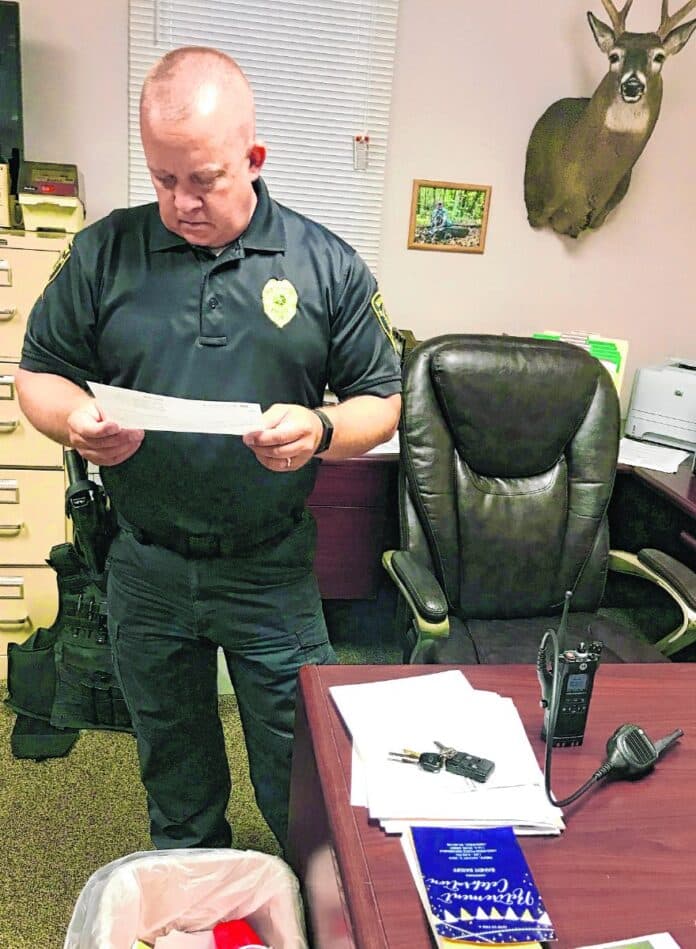
HANCOCK COUNTY — County law enforcement agencies are inching closer to making sure every police officer is equipped with a new radio capable of encrypted programming for private communications.
While the cost for a single new radio is high, an estimated $4,000 to $5,000, the payoff is well worth the investment, police said.
All police radios purchased after 2014 have the ability to carry encrypted communications.
[sc:text-divider text-divider-title=”Story continues below gallery” ]
Click here to purchase photos from this galleryThe technology allows law enforcement officers to communicate without the conversations going out freely, where they can be heard on civilian police scanners. Tactical conversations involving SWAT operations, warrant arrests, undercover drug busts and other police activity can sometimes be heard over the air.
“Say we have a SWAT situation and someone is barricaded in a home; we don’t want that person listening to what the officers are planning on doing,” said Capt. Joe Munden of the Greenfield Police Department.
Munden has been handling the process of phasing in the newer radios for the department and said GPD installed encryption programming for their investigative unit in December. City officials budgeted for the purchases of new radios over a three-year period. The rest of GPD radios are also ready to go.
While the GPD has the newer units, that’s not the case for all county law enforcement departments. Some are still in the process of purchasing the more expensive radios.
Officials with the New Palestine Police Department informed the town council recently they’ll need to purchase at least nine new radios at a cost of nearly $40,000. Now, they have to figure out how to pay for them.
Chief Bob Ehle said his department is trying to play catch-up with only three of its current radios capable of handling encrypted communications.
“We’ve never had to replace any of our older radios because they’ve always worked, but now with the encryption process, we’ve got to,” Ehle said.
They’ve set aside some funding to purchase a couple of units this year, and Ehle is hoping the department can phase in the remainder next year.
Elsewhere around the county, Paul Casey, McCordsville’s interim chief of police, the town bought new handheld radios for full-time officers a few years ago. It’s his understanding all of the radios are able to receive the new encryption key.
Robert Harris, public information officer for the Hancock County Sheriff’s Department, said many of their radios are already encryption-capable and will not have to be replaced. However, some older radios still in use will have to be replaced.
While some might think agencies are trying to hide their activity, agencies point out that encrypted communication also helps keep personal information, such as drivers license numbers and Social Security numbers, from being broadcast. They also said only a select number of channels will be encrypted.
The county’s 911 center is doing all the programming for the radios, and officials there said the county’s main dispatch channel will not be encrypted. The countywide plan is to have SWAT, investigation and a car-to-car channel for officers when group communication is needed.
As for civilians who like to listen to local police runs on scanners or via smartphone apps, they still can, except for those communications that will be encrypted.
The radio system for the county is controlled by the 911 center, the official licensee of the police radio frequency. Greg Duda, public information officer for the 911 center, said the encryption program has been available for the past 10 months.
Duda said the encryption issue is similar to using public Wi-Fi. That’s fine in a restaurant or at the airport, unless the user wants to check a bank balance or pay a medical bill online. That information can be intercepted in a public domain, and that sort of online activity is best done over a secure connection.
“This is like an encrypted talk group,” Duda said by way of comparison.
There is no definitive timeline for completion of the encryption project, Duda said. Officials at the 911 center are putting the new programming in service when police agencies ask. They’re also doing an inventory of all radios in the county to accurately determine the needs of each agency.
Once the countywide inventory is done, 911 officials will make some decisions on a timeline with agency officials to make sure the county’s law enforcement units are in sync.
[sc:pullout-title pullout-title=”At a glance” ][sc:pullout-text-begin]
Not all police communications will be encrypted. The main channel — the one used to dispatch units — will still be publicly aired. Sensitive communications, such as those involving SWAT operations or warrant service, will move to encrypted channels.
[sc:pullout-text-end]




